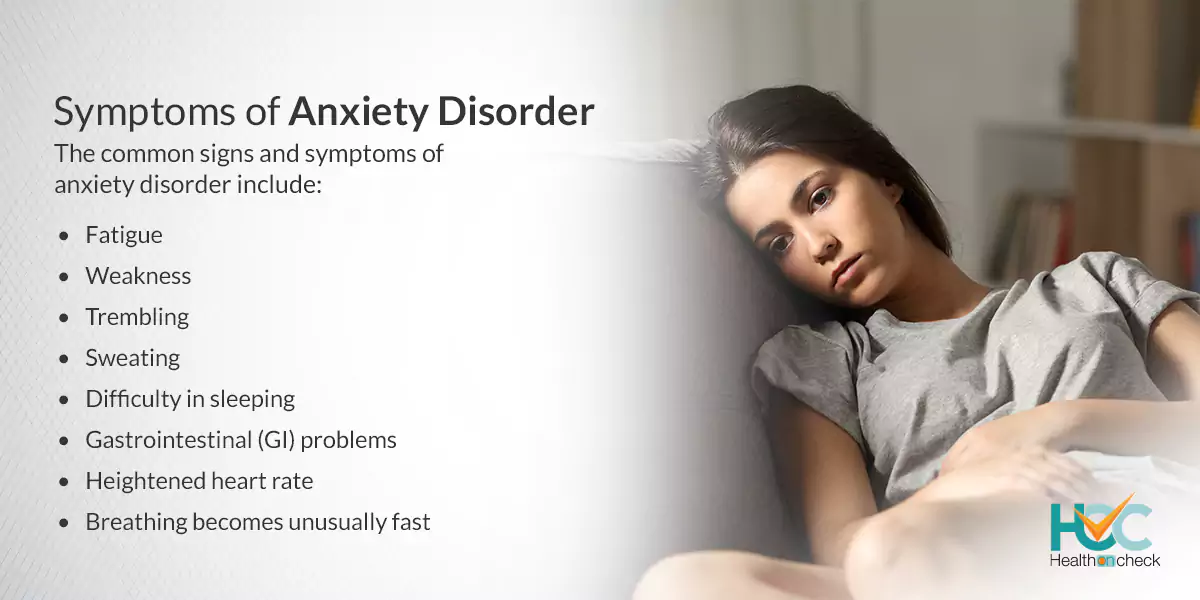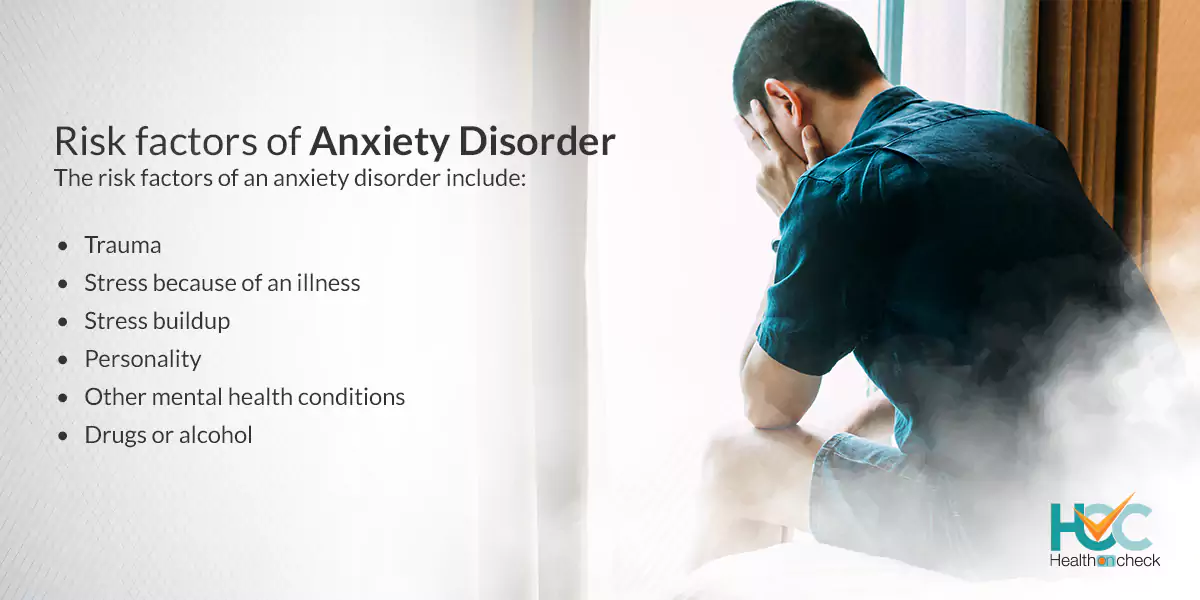ALL about Anxiety Disorder?

What is Anxiety Disorder?
An anxiety disorder is a mental health condition where you react to certain things with fear, nervousness, and dread. Experiencing anxiety sometimes is a normal part of life and everyone experiences it once in a while but people with anxiety disorder regularly experience intense, constant, and excessive worry and fear about certain things almost every day which can be debilitating sometimes. You may also feel physical signs of anxiety like sweating, and a pounding heart. Anxiety disorders are quite common and anyone can get affected by life and it may cause problems to carry out your daily activities and affect your performance at your job, or studies. People with anxiety disorders overreact when something triggers their emotions and are not able to control their responses to certain situations. Though anyone can get anxiety disorder but women are more likely to get affected by it than men.
What are the Types of Anxiety Disorders?
There are several types of anxiety disorders but some of the most common types of anxiety disorders include:
– Generalized anxiety disorder (GAD)
In this type of anxiety disorder, you may feel quite intense and abnormal tension and worry even if there are no events or things to make you feel so. You will feel tension or fear every day about things that are ordinary and routine. You might continuously worry about things such as your work, relationships, work, studies, etc and the worry continues from one thing to the next. Restlessness, problems concentrating, and sleeping are a few symptoms of a generalised anxiety disorder (GAD).
– Panic disorder
In panic disorder, you will have sudden but intense panic attacks. These attacks are stronger and more intense feelings than other types of anxiety disorders. During these panic attacks, you might have an intense feeling of impending doom along with shortness of breath, pain in the chest, or swift, fluttering, or heart palpitations. Sweating, heart palpitations (feeling of pounding heart), chest pain, and feeling of choking are some common signs and symptoms of a panic disorder.
– Phobias
It’s a type of panic disorder where you fear certain things, events, or situations. You will feel unusual fear about things and the intensity of fear does not match the situation. Some of the most common phobias are fear of heights, crowded places, flying, some animals, blood, darkness, etc.
– Separation anxiety
Mostly children and teenagers experience separation anxiety where they feel intense fear and worry about getting separated from their parents. Most of the children with separation anxiety fear that their parents may get hurt, or may not come back.
– Social anxiety disorder
People with social anxiety disorder experience overwhelming worry and self-consciousness even in normal daily activities and situations. They will constantly worry about being judged by others. They will avoid social situations because of feelings of embarrassment, self-consciousness, and feeling of being judged. Some people with this type of panic disorder totally avoid social gatherings and situations.
– Substance-induced anxiety disorder
It mostly occurs because of alcohol or drug abuse, side effects of medications, getting exposed to a toxic substance, and withdrawal from drugs.

What are the Symptoms of Anxiety Disorder?
The common signs and symptoms of anxiety disorder include:
– Getting nervous, tense, or restless even in normal situations
– Fearing an impending danger, panic, or doom
– Heightened heart rate
– Breathing becomes unusually fast
– Sweating
– Trembling
– Weakness
– Fatigue
– Problems to concentrate concentrating because of constantly worrying about certain situations
– Difficulty in sleeping
– Gastrointestinal (GI) problems
– Problems in controlling worry
– Avoiding situations and things that trigger anxiety
– Flashbacks of traumatic experiences
– Nausea
– Numbness in hands or feet
– Muscle tension
– Obsessive, abnormal, and uncontrollable thoughts
– Not being able to stay calm
What are the Causes of Anxiety Disorders?
Anxiety is a mental disorder and it does not occur because of personal weakness, upbringing, or character flaws. Researchers still don’t know what causes anxiety disorders but they suspect a combination of certain factors plays an important role in the development of anxiety disorders which might include:
– Chemical imbalance
If you are stressed about certain things for a long period of time then it can change the chemical balance that controls your mood. The feeling of stress over a long period can result in anxiety disorder.
– Environmental factors
If you have experienced some trauma like the death of someone close to you, divorce, or losing a job can trigger an anxiety disorder.
– Heredity
If you have a family history of anxiety disorders then there are high chance that you might also suffer from anxiety disorder.
– Medications
Sometimes anxiety disorders may occur because of the side effects of certain medications.

What are the Risk Factors of Anxiety Disorder?
The risk factors of an anxiety disorder include:
– Trauma
If you have experienced some traumatic events or abuse during your childhood then there is a risk of an anxiety disorder at some point in your life. Adults who experience a traumatic event also are at risk of developing anxiety disorders.
– Stress because of an illness
If you have a serious health condition then you may constantly worry about your treatment and your future which can lead to anxiety disorder.
– Stress buildup
Some kinds of smaller stressful life situations like the death of a loved one, stress at work, or ongoing worry about finances might trigger an anxiety disorder.
– Personality
People with certain personality types are at more risk to develop anxiety disorders as compared to others.
– Other mental health conditions
If you have other mental health conditions like depression, then your chances of developing anxiety disorder increase.
– Drugs or alcohol
Drug or alcohol abuse or withdrawal can lead to anxiety or worsen it.
What are the Complications of Anxiety Disorder?
The complications of an anxiety disorder include:
– Depression often comes with an anxiety disorder or some other mental health condition.
– Drugs and alcohol abuse
– Insomnia (difficulty in sleeping)
– Digestive problems
– Headaches and chronic pain
– Getting socially isolated
– Work or studies might get affected
– Poor life quality
– Suicide
How Anxiety Disorder is Diagnosed?
Feeling anxious at some point in your life is common as everyone goes through it once in a while but if you feel anxious constantly even in normal situations then it may be a sign of an anxiety disorder. In such instances, you can consult with a psychiatrist or psychologist who can help you to diagnose it as they are specialised in diagnosing and treating mental disorders. There are no particular tests available to diagnose anxiety disorders physically but they can be diagnosed through examinations, mental health tests, and psychological questionnaires. They may give you a psychological evaluation where your thoughts, feelings, and behaviour are discussed to help diagnose if you have an anxiety disorder. They will ask you questions about what you are feeling and then they evaluate the situation.
Anxiety disorder might develop along with depression and substance abuse. Also, specially designed interview and assessment tools might be used to diagnose an anxiety disorder. A physical exam, including blood or urine tests, may be carried out to rule out any underlying medical condition that might be adding to the symptoms you’re experiencing.
What are the Treatment Options Available for Anxiety Disorder?
There are three treatments options available for anxiety disorder including:
– Psychotherapy
It’s also known as talk therapy or psychological counselling where a therapist will help you to decrease the symptoms of anxiety disorders. Cognitive behavioural therapy (CBT) is very useful to treat anxiety disorders which focuses on teaching you certain skills to ease your symptoms along with helping you to gradually return to the activities and situations you are avoiding due to anxiety.
– Medication
You may be given certain medicines such as antidepressants, or anti-anxiety depending on the type of anxiety disorder you are suffering from. These medicines help to manage and reduce the symptoms of anxiety disorders.
– Complemental health techniques
This includes mindfulness, yoga, meditation, and self-management strategies like stress management which helps to treat anxiety disorders.
Living with an Anxiety Disorder?
If you have an anxiety disorder even doing your daily activities can be difficult for you. You will experience a constant feeling of fear, panic, nervousness, or worrying which might affect your work, studies, or relationships. Physical symptoms like sweating and a fast heartbeat may occur which may make you uneasy. Many people with anxiety disorders become socially isolated and life seems like a never-ending tunnel only with darkness. But you have to understand that it’s a mental condition just like any other mental condition and treatments are available which can treat your anxiety disorder completely. Discuss with your doctor to figure out your diagnosis and the best treatment plan. You can lead a normal, fruitful life after getting cured of your anxiety disorder.
Whom to Consult?
If you are worrying too much which is creating problems in your work, relationships, or other parts of your life then it may be a sign of an anxiety disorder. Feeling anxious once in a while is normal but if you constantly feel anxious then there might be a problem. In such instances, you need to visit your doctor immediately who might refer you to a psychiatrist or psychologist who will diagnose your problem and start treatment accordingly.




